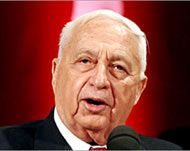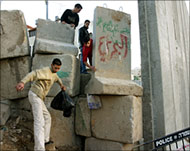Israel reroutes barrier to appease US
Israel is redrawing the route of the controversial separation barrier going up in the West Bank in order to secure US support for the project, political sources have said.

The rerouting will apparently cut out most of the controversial loops around Jewish settlements.
The sources said the new route would be presented to US officials due in Israel this week to hear a plan by Prime Minister Ariel Sharon to separate from the Palestinians.
A key Sharon security adviser, Giora Eiland, acknowledged at a security conference in Germany that the course of the separation barrier – dubbed the Apartheid Wall – placed hardships on the Palestinians and should be changed.
Sharon, in a trip to Washington, is widely expected to cement the disengagement plan which he said would leave the Palestinians with less land than they were seeking for a state.
The barrier, launched in 2002 by Israeli for “security” reasons, cuts deep into Palestinian land.
Palestinians call the project “a land grab” and the International Court of Justice is to hold hearings on the issue this month at the behest of the United Nations.
US backing
“A ruling against Israel in The Hague would likely end up as a vote in the UN Security Council,” a source in Sharon’s office said. “We need to make sure the Americans back us, hence the effort to agree with them on the route now.”
 |
|
A spokesman for Sharon’s office |
According to the source, the new draft route excludes most West Bank settlement blocs.
The Haaretz newspaper quoted Sharon’s chief of staff, Dov Weisglass, as saying he believed the final route would be 600km long and 100km shorter than the original approved by the government.
Eiland, head of Israel’s National Security Council and the official Sharon has asked to draw up plans for a “security line” in the West Bank and Gaza Strip, said the barrier was having repercussions on the lives of Palestinians.
Implications
“Israel should now study the full implications of the fence and take effective steps to improve them, including, where necessary, changing the original path of the fence,” he said at the Munich Conference on Security Policy.
 |
|
Saib Uraiqat says wall ”separates |
Palestinian cabinet minister Saib Uraiqat said a truncated barrier – a cement wall in some places and a razor wire-topped electronic fence in others – was only a half-measure.
“Whether 700 kilometres or 600 kilometres, this wall doesn’t separate Palestinians from Israelis but separates Palestinians from Palestinians,” Uraiqat said. He added that the barrier would undermine the US-backed peace “road map”.
Sharon, long the settlers’ godfather, shocked Israelis by proposing last week to dismantle 17 of 21 Gaza settlements and several in the West Bank, as part of a unilateral disengagement.
An official in his office said Sharon was considering moving some of the 7500 Gaza settlers to Jewish settlements in the West Bank, as one of several options under study.
Palestinians killed
On Sunday, Israeli troops killed a Palestinian activist and wounded five others in a Gaza raid.
An Israeli air strike on a car in Gaza on Saturday killed an Islamic Jihad resistance leader and an 11-year-old boy.
A Sharon adviser said US deputy National Security Adviser Stephen Hadley and National Security Council senior director Elliot Abrams would visit this week to study the Sharon plan.
Most of the international community sees the 145 settlements Israel has built in the West Bank and Gaza Strip as illegal.